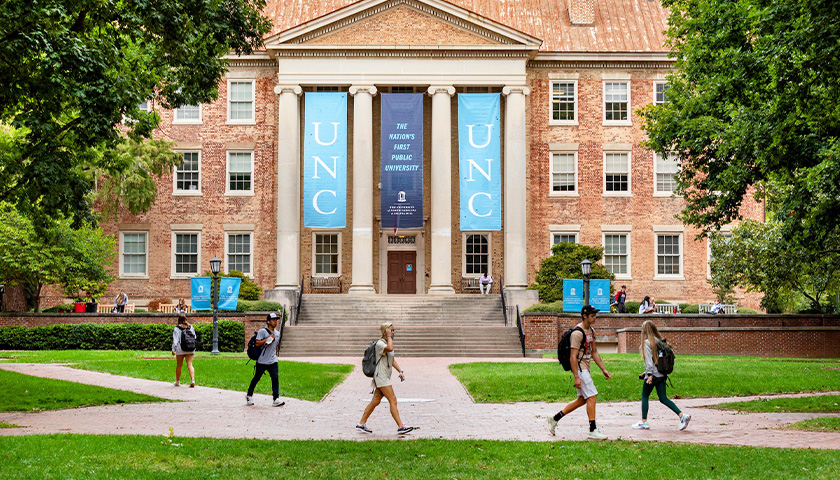by Alexa Schwerha
A University of North Carolina (UNC) nutrition fellowship program scrubbed criteria that made the fellowship exclusive to black, indigenous, and people of color (BIPOC) students after a civil rights complaint was filed alleging the program violated federal anti-discrimination laws, the program’s website reveals.
UNC’s Fellowship for Exploring Research in Nutrition originally claimed students must be a “Racial/ethnic background of [BIPOC] that is historically marginalized in academia and the field of nutrition in the United States” to be considered, according to a Dec. 19 snapshot of the website. However, the current website appears to have removed the criteria from the list.
The fellowship also updated its mission by claiming that it seeks to “enhance” rather than “increase” diversity in the nutrition field. The revised mission clarifies that the fellowship is open to all undergraduate students and includes “those from groups that have been shown to be underrepresented in health-related research.”
 “Obesity disproportionately impacts Black, Indigenous, and People of Color (BIPOC) and other historically marginalized communities; yet people from these communities are traditionally underrepresented among researchers working to develop, research, and evaluate food and nutrition policies to address obesity,” the website reads. “Increased representation in food policy research is critical for developing effective, equitable, comprehensive, and culturally competent policies that address nutrition-related health disparities.”
“Obesity disproportionately impacts Black, Indigenous, and People of Color (BIPOC) and other historically marginalized communities; yet people from these communities are traditionally underrepresented among researchers working to develop, research, and evaluate food and nutrition policies to address obesity,” the website reads. “Increased representation in food policy research is critical for developing effective, equitable, comprehensive, and culturally competent policies that address nutrition-related health disparities.”
Do No Harm Senior Fellow Mark Perry filed his Dec. 19 complaint with the United States Department of Education’s Office for Civil Rights on the basis that UNC’s program discriminated against non-BIPOC students. He claimed that the eligibility standard violated Title VI of the Civil Rights Act of 1964, which prohibits race-based discrimination.
This program violates Title VI of the Civil Rights Act of 1964.
Do No Harm Senior Fellow @Mark_J_Perry filed a federal civil rights complaint today vs. @UNC for race-based discrimination with the Office for Civil Rights. https://t.co/fldB1NLAtt
— Do No Harm (@donoharm) December 19, 2022
The program began accepting applications on Dec. 9, according to its website. The program will begin on May 29, 2023 and run for 9-weeks. Participating undergraduates receive a $19/hr wage, paid housing, research opportunities and professional development.
It is hosted by the Global Food Research Program, which is in UNC Chapel Hill’s Carolina Population Center. The program “provides a unique opportunity to undergraduate students interested in exploring research in food policy, with the long-term goal of increasing representation from groups historically underrepresented in nutrition research,” its website states.
UNC, Perry, the OCR, the Global Food Research program and the Carolina Population Center did not immediately respond to the Daily Caller News Foundation’s request for comment.
– – –
Alexa Schwerha is a reporter at Daily Caller News Foundation.
Photo “University of North Carolina” by The University of North Carolina at Chapel Hill.








